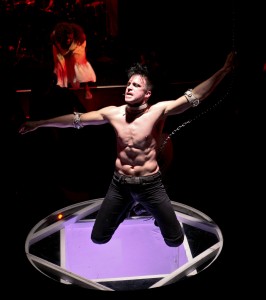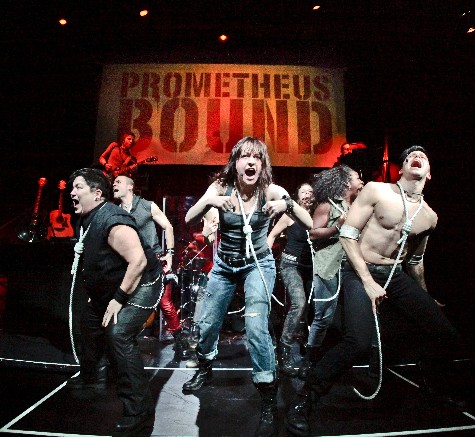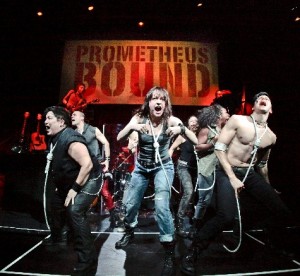Theater Review: Prometheus Bound — Bound for Glory (Revised 1X)
Bare chested and sweating up a storm, singer Gavin Creel as Prometheus makes for a rock rebel with lots of snarly attitude, defying Zeus’s tyranny by flexing his abs.
Prometheus Bound. Based on the play by Aeschylus. Written by Steven Sater with music by Serj Tankian. Directed by Diane Paulus. Staged by the American Repertory Theater at Oberon, Cambridge, MA, through April 2.
By Sarah Sanders
A rock-musical update of the Greek classic by Aeschylus, Prometheus Bound tells the story of the Titan god Prometheus, whom Zeus punished for giving fire to humankind, thus sowing the seeds of creativity and industry. For his crimes, Zeus strings Prometheus up on a mountain to be tormented by a pecking eagle for the rest of time. Inspired by the original script and written by playwright and lyricist Steven Sater, this dance-till-you-drop treatment of the tragedy, receiving its world premiere via the American Repertory Theater, sees the shackled god as a prisoner of the state, left to suffer at the hands of a tyrannical king desperate to keep his grasp on his unquestioned power.
Best known for the Broadway hit musical Spring Awakening, Tony and Grammy Award winner Sater teamed up with Serj Tankian, lead singer of the rock band System of a Down, to turn the ancient story into a bursting-at-the-seams, hard rocking piece of musical theater. In their joint vision, Prometheus comes off as a radical pitting himself—with all the pent up angst of a charismatic rock star—against the all-powerful Zeus.
Drawing on the rebellious nature of hard rock, the staging of the play itself breaks the passive, take-your-seat rules of conventional musicals; A.R.T director Diane Paulus uses the open space of the Oberon to its full advantage, immersing the audience in the performance. There is no proscribed stage space and very limited seating, leaving most of the crowd standing on the central dance floor, brushing shoulders with the performing actors, who swoop through the room on moving set pieces or on the shoulders of the stagehands. With the action so close, it hard not to be swept up in the performance, especially when the actors climb up the railings of the mezzanine and stomp on the tops of the tables, inches from some seated audience members’ faces and wine glasses.
In fact, that intimacy is part of what makes the show special. Before taking their marks, the actors walk through the crowd and personally welcome each audience member to the performance. The actors, decked out in fake tattoos, black eye-makeup, and combat boots, break down the traditional distance of performers from audience members—the smoozed-up crowd happily bob their heads to the music and fill the room with applause. And the talented cast members bring a sincere commitment to their roles that makes standing through an 80-minute performance worthwhile.
The entire cast is strong, but Gavin Creel’s Prometheus, standing shirtless chained to the central dais, commands the play with his unrelenting resilience in the face of senseless torture and unjust punishment. His performance is strong throughout and never goes campy or over the top, which is surprising given that he is essentially acting in the spotlight by himself. Gabe Ebert’s messenger god Hermes supplies a cruel sense of humor as he taunts and tortures Prometheus and the sleazy Oceanos (Michael Cunio), who encourages Prometheus to reconcile with Zeus, steals his scenes with his slick take on the Titan god of the seas.
The music, written by Tankian, wavered between in-your-face hard rock with screaming guitars to soft, moving ballads etched with heartache. The catch is that Prometheus Bound‘s heavy reliance on singing numbers detracts somewhat from its “tragic” content; the plot and its themes are expressed through the lyrics, which are lost to the audience because of the high volume of the singing and the sonic explosions of the live band. The few moments of the production without music were very good, especially the heartfelt breakdown of Io (Uzo Aduba). It would have been nice to see more scenes acted out rather than sung; it was as if the creators and director were afraid of trusting that the audience would appreciate what the play had to say, rather than what it screamed.
This fear of making quiet sense is ironic, since that strongest part of the work is its crucial message. Given what is happening around the world today, the show’s allusions to torture and tyranny are poignant and disturbing. With its producing partner Amnesty International, Prometheus Bound is on an important mission: to galvanize audiences into realizing that oppression and torture of any kind is intolerable. And the goal is concrete: each week’s performance is dedicated to a different prisoner of conscience across the world, which makes this musical a compelling marriage of political activism and rocking out.
====================================================================================
Singing The Promethean Blues
Prometheus Bound. Based on the play by Aeschylus. Written by Steven Sater with music by Serj Tankian. Directed by Diane Paulus. Staged by the American Repertory Theater at Oberon, Cambridge, MA, through April 2.
By Bill Marx.
First, it is a pleasure to report that the American Repertory Theater’s (A.R.T’s) world premiere production of a rock musical version of Aeschylus’s Prometheus Bound is no The Satyr Show, a Greek sequel (starring an old goat taking a booty call) to A.R.T. director Diane Paulus’s notorious The Donkey Show. The latter features wisps of Shakespeare’s verse (from A Midsummer Night’s Dream) blown away by muscular performers jumping, screaming, undulating, making out, hamming, and singing to disco hits of yesteryear played at head-ringing volumes. Yes, the performers in Prometheus Bound indulge in plenty of writhing, stomping, and hopping about, with a trio of the “Daughters of the Æther” standing on ladders, doing the same weepy-wavy choreography that hasn’t changed for over 2,000 years. (If I had to choose between watching that or having an eagle peck at my liver for eternity, it would be a toss-up.)
But this time around, the play, rather than the sexy leg-shaking, is (sort of) the thing. The book and lyrics are by Tony-winning Spring Awakening co-creator Steven Sater; the score is by Serj Tankian, best known as frontman for the alt-rock metal band System of a Down. The action focuses on Zeus’s sadistic punishment of Prometheus for giving man fire (which doesn’t just signify technology, but the arts as well). Accordingly, Paulus concentrates much of the action on Gavin Creel as Prometheus, a body beautiful Titan strapped down to a platform (stand in for a cliff) that for much of the action sits in the middle of Oberon’s dance floor. Bare chested and sweating up a storm, Creel makes for a rebel with snarly attitude, defying Zeus’s tyranny by flexing his abs, prophesying that the brutal god will have a reversal of fortunes, commiserating with visitors, including Io (well played and sung by Uzo Aduba), who was seduced by Zeus and is now doomed to wander the earth pursued by stinging gadflies.
The score is hard-driving and, for once, the modern metal headbanging fits the occasion—some of Prometheus’s speeches were written to be declaimed at full throttle on a cosmic stage. (Milton took notes for Paradise Lost). But, aside from some flickering ballads and occasional music hall steps for Zeus’s henchmen (an evil posse that includes comic Lea DeLaria wielding a baseball bat), the music delivers the same angry kick over and over again. If any character in the history of drama had a right to sing the blues, it is Prometheus. But there’s no bluesy wails, just lots of gut-busting rock. Prometheus has quiet moments of self-pity and delusion in the play—he isn’t just the Ultimate Angry Man.
The show’s lyrics are respectful, clearly sung, and amusing, given the distance between Aeschylus’s poetry and the musical equivalent:
Can’t lock me alone like a dog in a prison,
Lock a dog in a prison, he’ll howl from the soul —
And only get louder, the longer you wound him.
I gave to the humans,
And so I’m bent, broken, and tied —
And this is—this is your Zeus—and this is his crime.
This I will cry. . .
Aeschylus’s Prometheus Bound is treated as a hound dog yowl against tyranny, and that is fine up to a point—The Prometheus Project, a collaboration between the A.R.T. and Amnesty International, suggests that the tortured Titan exemplifies those imprisoned for speaking out for freedom and justice against tyranny. The kids are all right: at least they are trying to pay attention.
Still, this steamroller political approach, while serviceable as big beat entertainment, doesn’t convey that Aeschylus plants clues throughout the play that Zeus and Prometheus would reconcile—the dramatist starts off with a gloriously slam-bang big bang, but he was ultimately planning in the future to reconcile the script’s explosive contraries: freedom and order, art and responsibility, individuality and the collective, Zeus and Prometheus. Zeus was going to come around . . . one of the many ironies and poetic felicities that this hard-driving rock version rolls right over.
The A.R.T., in partnership with Amnesty International, is dedicating Prometheus Bound to Amnesty actions to free prisoners of conscience. The A.R.T. will be dedicating specific performances to prisoners of conscience around the world. Letters will be collected and opportunities to speak with Amnesty representatives. Community and student human rights organizations have been invited to join this initiative.
The cases to be covered in tandem with each performance are as follows:
March 7–9: Dem. Republic of Congo (Mass rape as a weapon of war)
March 10–16: Dhondup Wangchen (China)
March 17–18: David Cato (Uganda)
March 21–23: Tran Quoc Hien & Doan Van Dien (Vietnam)
March 24–25: Norma Cruz (Guatemala)
March 28–29: Reggie Clemons (USA)
March 30–31: Nasrin Sotoudeh (Iran)
For more information
Tagged: American Repertory Theater, Diane Paulus, Prometheus Bound, Serj Tankian





<blockquote cite ="…it was as if the creators and director were afraid of trusting that the audience would appreciate what the play had to say, rather than what it screamed"
Having read that makes me even more interested in seeing the performance for reasons beyond my understanding.
Bill Marx, you are getting soft. This Prometheus was pure baloney, noise and clatter, and crappy music, and we’ve seen those “The Warrior “costumes, the snarly attitude, and the lame choreography a thousand times. My wife, Amy, yawning, recalled Jesus Christ, Superstar, all the same moves but with at least a couple of hooky songs. Did anyone in the audience care for a second about Prometheus’s plight? Bring back Robert Woodruff!
What’s a critic to do? On one hand I am accused of going soft on Prometheus Bound, on the other I have the publicist of the American Repertory Theater complaining to me in an email that the review is nasty. I could end there and say as a critic I must be doing the right thing because nobody is happy. But I have a couple of other points.
It is a matter of expectations—most likely a rock musical of Prometheus Bound is not going to provide the original’s poetry and complexity. (The matter of sympathy for the afflicted Titan is an interesting one, given that his is a necessary fall that will be rewarded by Zeus’s forgiveness at the end.) So you go with what’s there—some of the amusement of the A.R.T. evening for me is hearing people sing, with baseball bats in their hands, about Prometheus being in the doghouse. That said, I can’t remember a song or lyric from the show—but unlike The Donkey Show franchise (coming to a wedding near you?) the evening has a strong storyline, centralized staging, some rousing energy, and is about something besides the joys of hedonism.
I agree with your wife’s comparison to Jesus Christ Superstar. From what I have seen of her work in Boston so far (I missed the Robot opera), director Diane Paulus proffers a retro/recycled, counterculture popularism supported by New Media marketing. One local critic recently suggested, perhaps as a compliment (?), that Paulus sees the world as Studio 54. Anti-intellectualism is part of the current package, partly as a reaction to the perceived “heavy thinking” of the preceding decades at the A.R.T. We are all Broadway-ized headbangers now . . .
Finally, I am in favor of bringing director Robert Woodruff or any other talented appreciator of modernism back, but I am not so soft as to forget or forgive the hours of self-indulgent, auteurist shenanigans I had to sit through with Promethesque patience, from performers speaking Shakespeare in their underwear and a roller-derby inspired Romeo and Juliet to slow-mo demolitions of Ibsen. Crap comes in various forms—and at least Prometheus Bound isn’t pretentious.
Nine tenths of the above is the bilious Bill Marx I love and admire, but getting off on the “amusement” of Prometheus Bound, belting songsters with baseball bats? Aeschylus ain’t the Sox!
If ever a play called for a minimalist approach (i.e., Peter Brooks’s current staging of Beckett’s Rockaby ), it’s pre-Oresteia Prometheus.
FYI, “Prometheus” is in its LAST week of performances–don’t miss it! For $10 off all tickets, use the code “probo10” at http://bit.ly/PBtickets